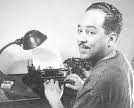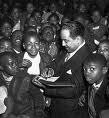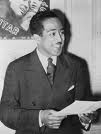“Put it before them briefly so they will read it, clearly so they will appreciate it, picturesquely so they will remember it, and above all, accurately so they will be guided by its light,” (Joseph Pulitzer). American author Langston Hughes was an inspiring and intelligent writer as well as a poet. He was a moving spirit in the Harlem Renaissance of 1920’s. Langston Hughes has motivated and inspired many African Americans for half a century and that’s why he is called a hero today.
 |
| Langston Hughes typing a poem |
James Mercer Langston Hughes was the son of Carrie Mercer Langston Hughes and James Nathaniel. He was born February 2, 1902 in Joplin, Missouri. His mother lived a transitory life searching for a job, so Langston was often living with his maternal grandmother. His grandmother passed away in 1910 so he went to stay with family friends in Kansas. He finished high school in 1920 and moved to Mexico with his dad. He wanted to go to Columbia, but he needed his dad to give him money to attend. His father did not approve of what he did. So they made an agreement that Langston would study engineering, so then as he could attend Columbia. In 1922, after a year in Columbia, Hughes left because of racial prejudice. Hughes started to work many odd jobs and traveled to West Africa and Europe. He returned back to the U.S in 1924 and became a busboy at a Washington D.C, hotel. While there he attracted the attention of poet Vachel Lindsay. Hughes published his first book called The Weary Blues in 1926. In 1930 Langston considered himself a primarily poet, but also wrote many plays and short stories. From 1932 to 1967 he continued to write and published poems, stories, and plays. He won numerous awards for his talent. Langston Hughes died May 22, 1967 in New York City after abdominal surgery, related to prostate cancer; he was 65 years old. His ashes are buried beneath the floor in the middle of the foyer leading to the auditorium named after him. Because of his inspirational writing and his participation in the Harlem Renaissance Langston Hughes should be considered a hero.
Langston Hughes was known best for being an inspirational writer and poet. He motivated many African Americans around the world to express themselves throughout their own writing. He inspired many African Americans with his essay entitled ‘The Negro Artist and the Racial Mountain published in Nation in 1926’. It spoke about how a talented Black writer would prefer to be considered a poet, not a Black poet. Langston says,” No great poet has ever been afraid of being himself” (Langston Hughes). This shows that he is not afraid to express his nationality and wants to be appreciated for what he does as being a black man. This also demonstrated that African Americans should do what they dreamed of doing and should not be afraid what anyone says about them. He also encouraged many through his writing because he was free about everything he chose to do. He helped many people out with his writing and spent much time revising his poems. Many say that he corrected things he wrote in green ink. Hughes said,” An artist must be free to choose what he does, certainly, but he must also never be afraid to do what he might choose,” (Langston Hughes). This quote shows that Langston felt free to do anything he chose to do and he was not afraid to choose those things he wanted to do.
 |
| Langston hughes (google.com) |
“The Harlem Renaissance was a manifesto for new generation of black artists whose literary, musical, and artistic work defined the movement by departing from the unspoken but understood expectations of black writing that had come before,” (Maurice Wallace)”. Langston is a hero because of his participation in the Harlem Renaissance. Hughes was considered one of the leading voices of this movement. His essay, “The Negro Artist and the Racial Mountain”, was the meaning of the Harlem renaissance. In his essay he says, “We younger Negro artists who create now intend to express our individual dark-skinned selves without fear or shame. If white people are pleased we are glad. If they are not, it doesn’t matter. We know we are beautiful. And ugly too," (Hughes). This quote shows that his position reflected a change in mood in black America. This also demonstrates better understanding of the creativity and intelligence of black poets of the twentieth century. Langston Hughes inspired countless blacks to look beyond Harlem and gave them hope. “His home was in Harlem but in his mind reached well past Harlem toward places oceans away” (The Harlem Renaissance 77). This quote shows that he inspired many African Americans to reach beyond the boundaries of Harlem. Hughes encouraged many to think outside the box and not to be discouraged, to reach for the stars.
 |
Langston Hughes continues to be a hero to many as he inspires many African Americans with his inspirational writing and how he transformed blacks during the Harlem Renaissance. His poems and writings lead many to be free and choose what they want to do, while not being afraid to do it. Additionally he motivated many African Americans to be creative and write, and to do what they believe in, to follow their dreams. Langston Hughes is inspirational to many because he helped them pursue their dreams while breaking many racial barriers. His reputation with African American readers remains strong to this day because he is a great poet and writer. Langston Hughes was both powerful and motivated. He accomplished many things during his life that inspired people to write and follow their dreams. This is why he is considered a hero today.
Hughes, Langston (1902-1967)." DISCovering Biography. Online ed. Detroit: Gale, 2003. Student Resource Center - Gold. Gale. DEL NORTE HIGH SCHOOL. 20 May. 2010
"Hughes, (James) Langston (1902-1967)." DISCovering Authors. Online ed. Detroit: Gale, 2003. Student Resource Center - Gold. Gale. DEL NORTE HIGH SCHOOL. 20 May. 2010.
langston hughes . N.p., n.d. Web. 30 Apr 2010.
Maurice Wallace. Langston Hughes the Harlem Renaissance. Tarry town New York: Marshall Cavendish Corporation, 2008
Saunders. "Hughes, Langston (1902-1967)." Encyclopedia of World Biography. Ed. Suzanne M. Bourgoin. 2nd ed. Detroit: Gale Research, 1998. 17 vols.Student Resource Center - Gold. Gale. DEL NORTE HIGH SCHOOL. 20 May. 2010.
Page created on 5/28/2010 12:00:00 AM
Last edited 5/28/2010 12:00:00 AM
